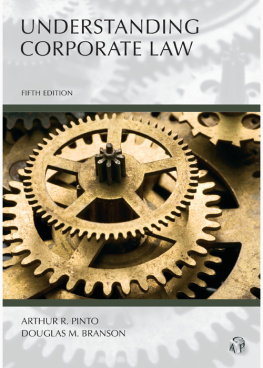Inside the MindsThe Corporate LawyerIndustry Insiders on the Successful Practice of Business Law
Published by Aspatore, Inc.
For corrections, company/title updates, comments or any other inquiries please email .
First Printing, 2003
10 9 8 7 6 5 4 3 2 1Copyright 2003 by Aspatore Books, Inc. All rights reserved. Printed in the United States of America. No part of this publication may be reproduced or distributed in any form or by any means, or stored in a database or retrieval system, except as permitted under Sections 107 or 108 of the United States Copyright Act, without prior written permission of the publisher.
ISBN 1-58762-232-7
Inside the Minds Managing Editor, Carolyn Murphy, Edited by Georgia Mullen, Proofread by Stephanie Afonso, Cover design by Scott Rattray & Ian Mazie
Material in this book is for educational purposes only. This book is sold with the understanding that neither any of the authors or the publisher is engaged in rendering medical, legal, accounting, investment, or any other professional service. For legal advice, please consult your personal lawyer.
A special thanks to all the individuals who made this book possible.
The views expressed by the individuals in this book (or the individuals on the cover) do not necessarily reflect the views shared by the companies they are employed by (or the companies mentioned in this book). The companies referenced may not be the same company that the individual works for since the publishing of this book.
www.Aspatore.com
Aspatore Books is the largest and most exclusive publisher of C-Level executives (CEO, CFO, CTO, CMO, Partner) from the world's most respected companies. Aspatore annually publishes C-Level executives from over half the Global 500, top 250 professional services firms, law firms (MPs/Chairs), and other leading companies of all sizes. By focusing on publishing only C-Level executives, Aspatore provides professionals of all levels with proven business intelligence from industry insiders, rather than relying on the knowledge of unknown authors and analysts. Aspatore Books is committed to publishing a highly innovative line of business books, redefining and expanding the meaning of such books as indispensable resources for professionals of all levels. In addition to individual best-selling business titles, Aspatore Books publishes the following unique lines of business books: Inside the Minds, Business Bibles, Bigwig Briefs, C-Level Business Review (Quarterly), Book Binders, ExecRecs, and The C-Level Test, innovative resources for all professionals. Aspatore Books also provides an array of business services including The C-Level Library, Assemble Your Own Book, SmartPacks, Establish Your Reading Profile, and Build Your Own Library as well as outsourced business library and researching capabilities. Aspatore is a privately held company headquartered in Boston, Massachusetts, with employees around the world.
Overview of Corporate Law Practice
Jerry B. Black
Wilson, Elser, Moskowitz, Edelman &Dicker, LLP
Partner, Head of Corporate Practice Group
Introduction
The practice of corporate law is extremely diverse, involving intellectual, technical legal, business, judgmental, practical, relationship and personal skills. The ability to combine skills in all these areas will contribute significantly to the success of the corporate lawyer and the personal rewards and satisfaction which the corporate lawyer will derive from the practice of corporate law. To provide an overview of factors which are relevant to the successful practice of corporate law, there is discussed briefly below the role of a corporate lawyer, the corporate lawyer-client relationship, understanding the needs and objectives of a client, the success of the corporate lawyer, current trends and key issues, and some observations regarding personal issues involved in corporate law practice. The discussion is intended only as a succinct overview of subjects, which are diverse and complex, but will serve as an introduction and provide a basis for further consideration and analysis by the reader.
The Role of a Corporate Lawyer
The role of a corporate lawyer may be extremely varied depending upon the needs of the client, the purpose or purposes for which the corporate lawyer is retained, the applicable circumstances, the expectations and needs of a client and the corporate lawyers personal views of the role and responsibility of the lawyer both as a general matter and as a corporate lawyer. The principal aspects of the role in general terms include advising the client, implementing the business objectives of the client, protecting the interests of the client, limiting risk to the client, providing general and transactional business advice, negotiating business and documentation issues, and drafting relevant documentation. These general statements regarding such a role are discussed in additional detail below.
Advising the client. Advising a client will vary considerably depending upon the role or mandate of the lawyer and the nature of the clients needs, but in the broadest sense includes providing views, suggestions, commentary and ideas regarding a matter or an issue. This may involve analyzing the risks, problems and strategy of achieving objectives, particularly the clients objectives while limiting the level of risk to the client. The role may vary considerably depending upon the knowledge and skills possessed by the client. Thus, certain clients may require very little business advice regarding some or all issues and in structuring solutions to issues and problems, while others may require a great deal. The needs of a specific client may vary depending upon the clients familiarity with a specific matter. For example, the client may be very familiar with certain types of matters and transactions and very inexperienced in others. Certain clients may have little awareness of the relevant legal issues, while others may be very familiar with some and unfamiliar with others; some may be very familiar with the legal issues relevant to that client. Thus, the extent and nature of the advice both requested and needed may be very different. This will influence the nature of advice the corporate lawyer should provide the client.
At times, the corporate lawyer may act as much in the capacity of a business advisor as a lawyer. The corporate lawyer should focus on business issues that affect the client and bring relevant business developments and the lawyers previous experiences relating to client matters and issues to the clients attention. In addition, as appropriate, the corporate lawyer advises the client regarding business questions raised by the client. The lawyer may also identify business opportunities or assist the client in developing or taking advantage of existing business opportunities or situations. For example, the lawyer may help the client find or establish a new customer relationship, find a supplier on favorable terms, or find financing through other clients or other legal and business dealings the lawyer has.
Implementing Business Objectives. To implement the clients business objectives, the lawyer must understand the clients business, short and long term goals, financial position, and the importance of the issue or matter to the client in terms of financial, business strategy and other objectives. The lawyer should understand the clients priorities in all these respects, what the client considers non-negotiable, and the degree to which the client may concede on a particular issue, which may be critical as part of the negotiation process, particularly in terms of the overall relationship of issues and objectives in a specific matter and even in connection with a series of related or even unrelated matters. The lawyer should also be able to recognize the difference between a business issue and a legal issue, since generally the client will not and often should not rely as much on the lawyer to be instrumental in the analysis or resolution of what are primarily business issues or decisions. The lawyer should be able to set out alternatives that will permit the client to achieve its goals while not compromising its priorities. The alternatives should be presented in terms of achieving a specific objective and also in terms of their relationship to achieving other objectives and issues on both a short-term and long-term basis.









